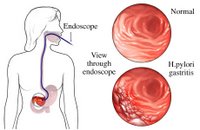| Some Stuff |
|
| Some MORE Stuff |
|
|
| Gastritis |

Gastritis is not a single disease process but a group of disorders that involve inflammation of the stomach lining. It result from chronic use of pain relievers such as NSAIDS in some individuals or it may be due to a bacterium that is causing most ulcers in the stomach. This condition may occur suddenly (acute gastritis) or it may develop gradually (chronic gastritis).
The most common symptom is upper abdominal pain characterized by a burning sensation and usually noted with intake of food. This is often accompanied by nausea, vomiting, belching, a feeling of fullness which often leads to weight loss when the condition becomes chronic. In some individuals, gastritis increases risk for ulcer formation and stoamch cancer. In these group of individuals, gastric bleeding is common.
The main cause of gastritis is damage to the mucosal lining of the stomach. With damage there is lost of the normal mucous barrier that serves to protect the stomach lining from irritation and inflammation. One of the many factors that contribute to the damage of this protective stomach lining is chronic use of pain relievers known as NSAIDS. This is exemplified by iboprofen and aspirin. Other factors include excessive use of alcohol, stress, bacterial infection (H. pylori) which is also the number 1 cause of stomach ulcers, and a list of autoimmune disorders like Crohn’s disease. Radiation and chemotheraphy is also contributory.
Knowing the cause of the condition makes prevention easier. If there is really a need for use of pain relievers, use acetaminophen instead. Avoid alcohol and eat in smaller amount but in higher frequency with avoidance of spicy and fatty foods. It is also important to eat regularly at meal times. Manage stress and have a regular exercise that you enjoy. This will allow you to move your waste through the intestines regularly. |
|
|
|
|
|